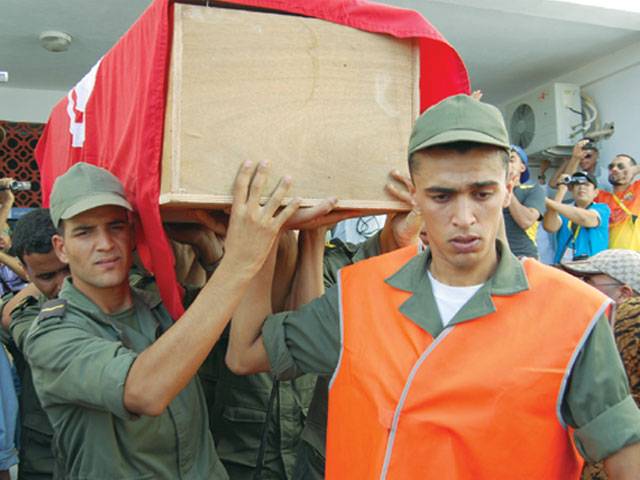TUNIS - Tunisia mourned Tuesday eight soldiers slain by militants as appeals for unity from the Islamist-led government and the calling of a general election for December failed to quell violent protests.
As pressure mounted for the government to resign, Interior Minister Lotfi Ben Jeddou said he considered stepping down but would stay put until the formation of a unity government capable of tackling political tensions and unrest.
The soldiers were found Monday, their throats slit after they were ambushed by an armed group in Mount Chaambi near the Algerian border where the army has been tracking Al-Qaeda militants.
Their brutal killing triggered protests in the nearby eastern city of Kasserine, where demonstrators ransacked the local office of the ruling moderate Islamist Ennahda party overnight, an AFP correspondent reported.
The attack came despite calls by President Moncef Marzouki for national unity and after Islamist Prime Minister Ali Larayedh announced that a general election would be held in December.
The poll is seen as a concession aimed at appeasing a growing mood of rebellion in Tunisia, where emotions have run high since last week’s assassination of a prominent opposition MP.
Many Tunisians want the government to go, believing it is responsible for Thursday’s murder of Mohamed Brahmi - the second opposition figure killed since February.
The North African nation, cradle of the wave of popular uprisings that swept the region, has been rocked by almost a week of violent anti-government protests.
The interior minister told a Tunisian radio station he wanted to see a unity government as soon as possible.
“I considered handing in my resignation along with other security officials but in light of developments I decided to stay until the formation of a government that includes all the parties, and which will overcome their selfishness in order to meet the challenges and combat terrorism,” he told Mosaique FM.
On Monday, the prime minister defiantly insisted his government would stay put.
But both Ennahda coalition partner Ettakatol and the 500,000-strong General Union of Tunisian Labour (UGTT) separately called a new government to stave off tensions.
The powerful UGTT, a key player in the 2011 uprising that ousted veteran strongman Zine El Abidine Ben Ali, did not however back the call of thousands of protesters who have been demonstrating nightly outside the National Constituent Assembly calling for its dissolution.
“This government will stay in office,” Larayedh told state television.
“We are not clinging to power, but we have a duty and a responsibility that we will exercise to the end,” he said on Monday, proposing instead that a general election be held on December 17.
Just hours later, officials announced the murder of the soldiers near the Algerian border where troops have been hunting Al-Qaeda-linked militants.
State television ran pictures of the mutilated corpses of the victims, some of whom had their throats cut and were stripped of their weapons and uniforms.
In a televised address, Marzouki, the secular president who is allied to Ennahda, called for national unity after the soldiers’ deaths as his office announced three days of national mourning.
“If we want to face up to this danger we have to face up to it united,” he said.
“I call on the political class to return to dialogue because the country, society, is under threat.”
Marzouki also referred to Brahmi’s assassination and regretted that this “tragedy” had divided the country.
Since Brahmi’s death, around 60 deputies have been boycotting the assembly, which is drawing up the country’s new constitution.
The government, and the UGTT, stressed that deputies must return to work and vote on the much-delayed constitution, one of the thorniest issue in post-revolution Tunisia.
“We think that the National Constituent Assembly will complete the electoral code by October 23 at the latest so elections can be held on December 17,” Larayedh said.
December 17 is a significant date in Tunisia.
It was on that day in 2010 that fruit vendor Mohamed Bouazizi burned himself alive in the town of Sidi Bouzid, beginning the Tunisian revolution that ended Ben Ali’s 23-year grip on power.
In the past few days, police have clashed with protesters in both Tunis and Sidi Bouzid, which is also Brahmi’s home town.
Friday, April 19, 2024
Tunisia mourns slain soldiers, urges unity

Parvez Elahi’s indictment delayed again in two cases
April 19, 2024
SC suspends ECP’s re-polling order in PP-51
April 19, 2024
Court approves plea bargain of Parvez Elahi’s co-accused
April 19, 2024
Zardari creates another parliamentary record
April 19, 2024
KP politicians, civil society laud President’s address
April 19, 2024
A Tense Neighbourhood
April 19, 2024
Dubai Underwater
April 19, 2024
X Debate Continues
April 19, 2024
Hepatitis Challenge
April 18, 2024
IMF Predictions
April 18, 2024
Kite tragedy
April 19, 2024
Discipline dilemma
April 19, 2024
Urgent plea
April 19, 2024
Justice denied
April 18, 2024
AI dilemmas unveiled
April 18, 2024
ePaper - Nawaiwaqt
Advertisement
Nawaiwaqt Group | Copyright © 2024





